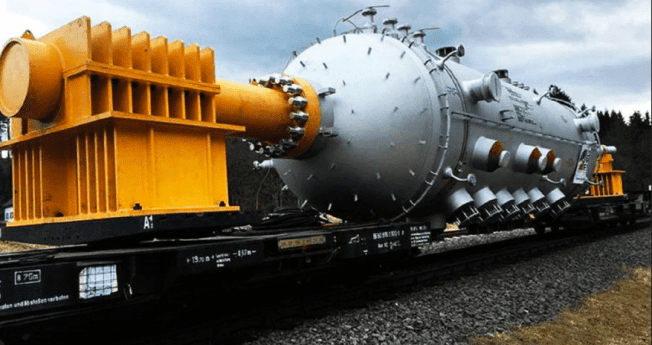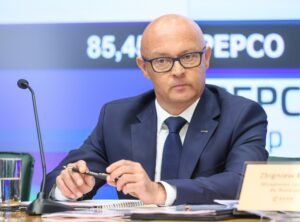„We are waiting for the conclusions of the audit, which has been going on for a very long time. When talking about the potential risks for the project – we still don’t actually know how the nuclear project in Pomerania will be bankrolled, so perhaps this is where we could point to a potential risk,” Przemysław Gorzkowski, lawyer and Chief Legal Officer at Nuclear PL tells BiznesAlert.pl.
- „The audit has been taking place since December, but we don’t even know what it includes. It probably pertains to the first project in Lubiatowo-Kopalino,” Gorzkowski believes.
- „We do not expect far-reaching conclusions. We have confirmation from government representatives on the choice of location, on the continuation of the project in Lubiatowo-Kopalino. Maybe there will be some minor changes, or maybe some conclusions regarding the adopted formula of contracting, the choice of supplier, contractor or the form of conduct of proceedings will not be necessarily optimistic. Nevertheless, we are not expecting any revolution when it comes to the results,” Gorzkowski believes.
- „The Polish Nuclear Energy Program (PEJ) explicitly says that we will not build any SMRs. I think that if the audit had a broader scope, we should also include SMRs,” said Przemysław Gorzkowski.
Currently in Poland the country’s first NPP project is being audited. This review is being conducted by Maciej Bando, the Government Plenipotentiary for Strategic Energy Infrastrcuture. The purpose of the audit is to verify the selected location for the power plant and the schedule for the implementation of this ambitious project. Within 4-6 weeks, we expect proposals that will determine the real date for the launch of the first nuclear unit in Pomerania.
It is worth stressing that the location of the investment is not being questioned and the project will be implemented in Lubiatowo – Kopalino in the Choczewo commune with a consortium of American companies – Bechtel and Westinghouse. Despite some controversy, there are no plans to change locations or partners. However, the schedule of the project remains an open question as originally it said the first power will be generated in 2033.
What conclusions can be drawn from the audit of the atom?
„The audit has been in progress for a long time, I think since December, but we don’t actually know what it encompasses – we don’t know. It probably includes the first project in Lubiatowo-Kopalino,” says Gorzkowski. The conclusions of the audit may vary, but I do not expect them to go very far. We have confirmation from government representatives as to the choice of location, as to the very continuation of the project in Lubiatowo-Kopalino. There may be some slight changes, or there may be some conclusions, not necessarily positive, about the adopted formula, the method of choosing a supplier, contractor or the form of conducting the procedure. Nevertheless, I do not expect the conclusions will be revolutionary,” the expert emphasizes.
The expert notes that although changes in the project in Lubiatowo are possible, he does not expect a revolution. The audit mainly covers one project, but there is no clarity as to its exact scope.
Are there any obstacles already?
The audit is currently one of the most important topics in the context of energy. The issue of what potential obstacles may emerge soon seems interesting? The expert answered this question.
„In the first project, we are still at a fairly preliminary stage, PEJ has in principle some of the required permits (we are waiting for the application for a building permit), it has a design contract, but we do not have a secured contract for the next stage, maybe this is not an obstacle, but it is certainly a challenge for the investor and contractor,” he stressed.
But that’s not all. According to the expert:
„We still do not have full knowledge of how to finance the nuclear project in Pomerania, so perhaps here we can indicate some potential risks. This is, after all, the key issue for the possibility of carrying out such a project.”
Further, our interlocutor drew attention to issues related to projects other than Lubiatowo-Kopalino:
„Another challenge is to start work on the second project, which is provided for in the Polish Nuclear Energy Program. This program is to be updated, in accordance with the government’s announcements, updated by the end of this year. But we should implement the assumptions of the previous one and also think about the second project that was planned there, and there is silence about it, so it is definitely a challenge for the government to decide what to do next with this project,” he added.
„Similarly with the work on the PGE PAK project – we should finally hear the government’s position on these plans. There are preliminary agreements, the project received the decision-in-principle, good specialists have been associated with it, but without the „blessing” of the government it will not launch,” said Gorzkowski.
The Polish Nuclear Energy Programme did not include the issue of small modular nuclear reactors (SMR). This Program is a strategic government document that sets out a “road map” for the construction of the first Polish nuclear power plant. Its aim is to implement investments in nuclear power plants with a total installed capacity of about 6 to 9 GWe.
These plants will be based on proven, large-scale, pressurized water generation III (+) nuclear reactors. SMR, or small modular nuclear reactors, is a new technology that is gaining increasing recognition both in the Polish energy sector and in the world. Experts predict that the war and limited access to raw materials in the coming years will contribute to the increased development of these small nuclear reactors. However, currently the Polish Nuclear Power Program does not include SMRs.
„The Polish Nuclear Energy Program explicitly says that we will not build any SMRs. I think that if the audit was carried out in a broader scope, then we should also take into account SMRs, especially the „larger” ones,” said the expert.
„In conclusion, it is important to close the stage of audits and checks and move on to implementation. We cannot afford to waste any more time, and unfortunately this is how we should perceive the tardiness of the decisions-makers. The market and experts, including us at Nuclear PL, are looking forward to this with great impatience, believing that political decisions will follow the needs of the market and the expectations of society,” he stressed.
Compiled by Mateusz Gibała









